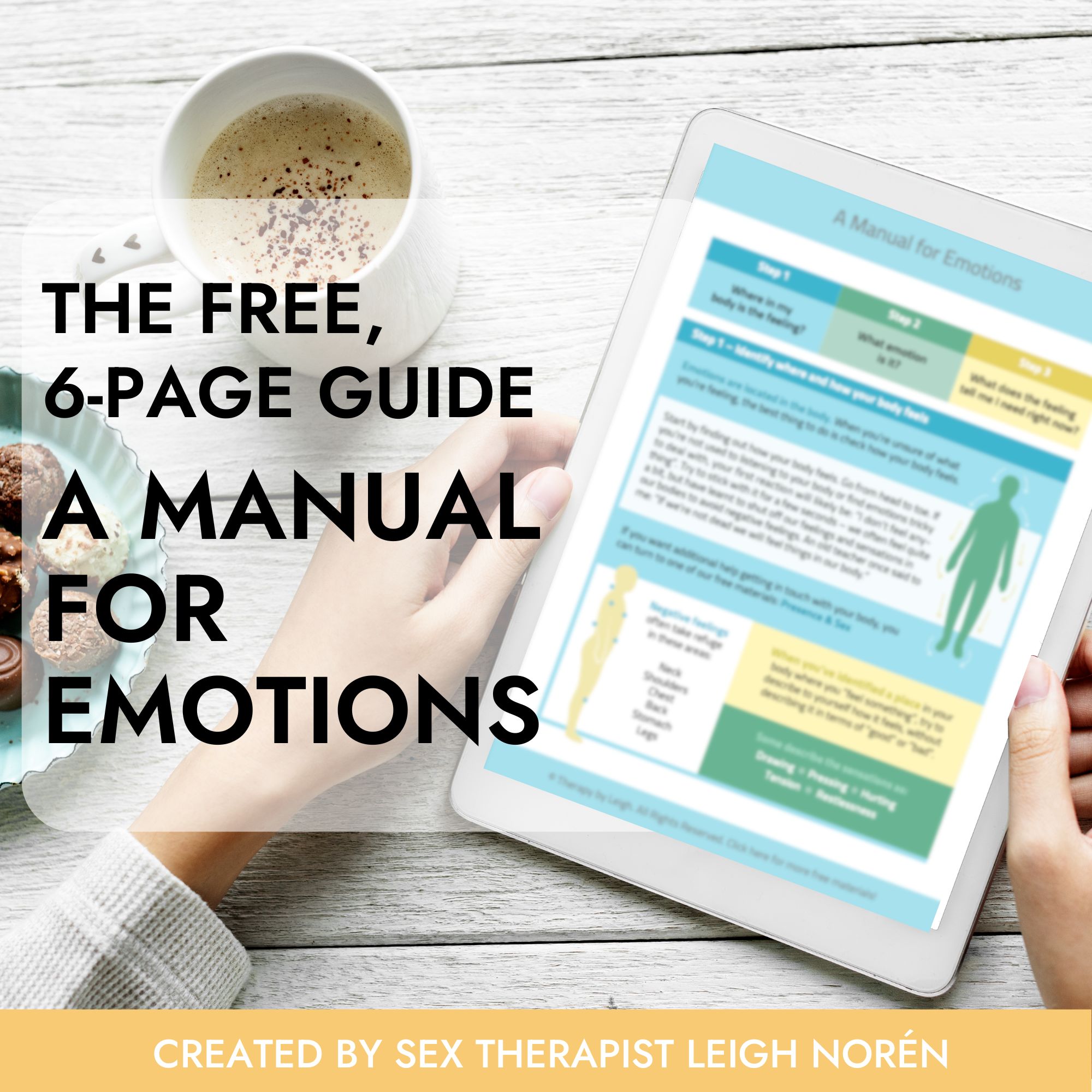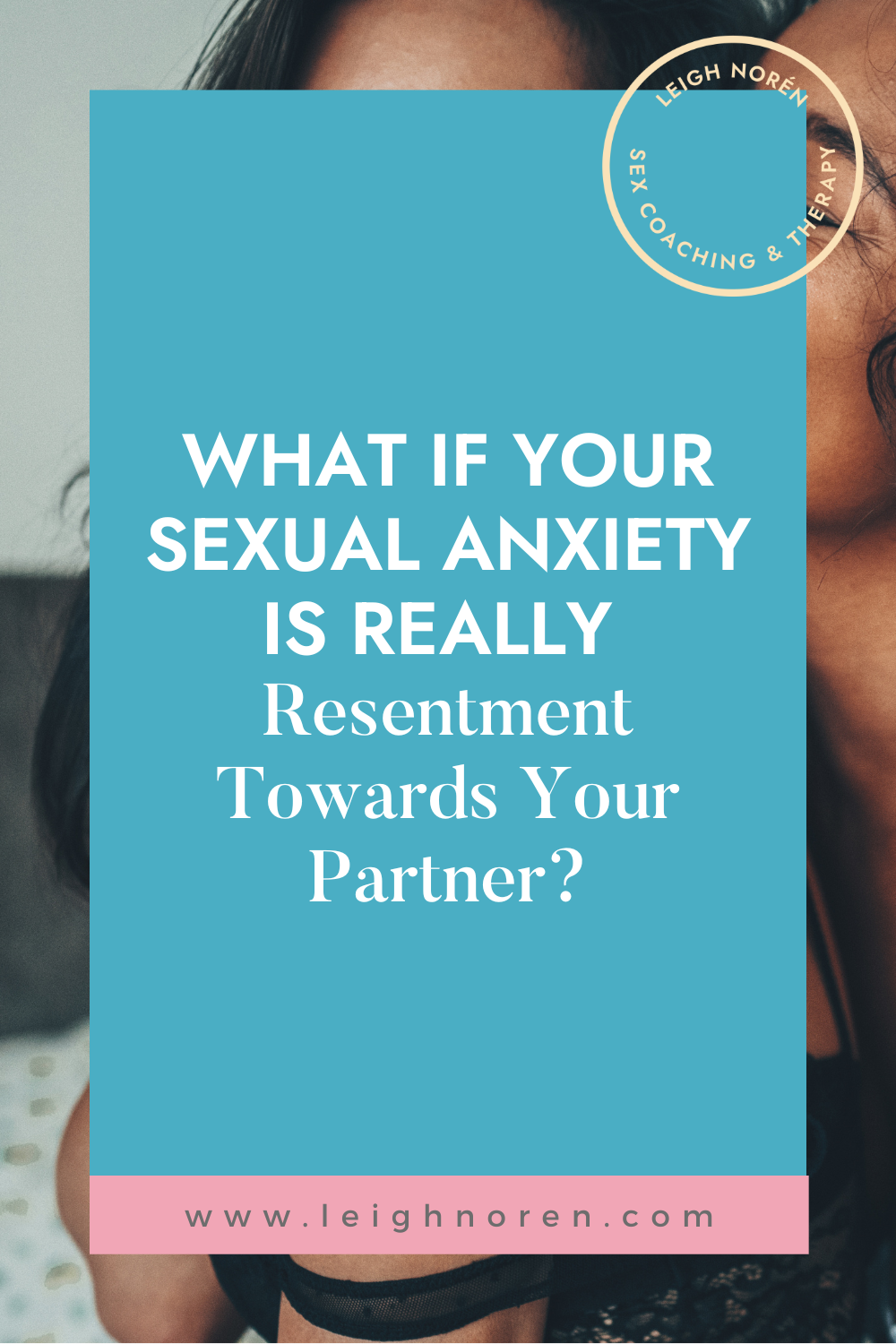What If Your Sexual Anxiety Is Really Resentment Towards Your Partner?
8 min read
Feeling sexual anxiety? You’re not alone.
When relationships are in their honeymoon period – sex and connection tend to come easily. You’re full to the brim of love hormones and as you get to know each other, it’s easy to show your very best side. How could your sex life not thrive in such an environment?
But once this phase wanes, for many people, things start to change. As you let your guard down and show more of your true self, flaws start to shine brightly.
The things you used to love about your partner suddenly start to annoy you. Did they always chew that loudly? Did they always expect sex as soon as you stepped out of the shower?
Often this is the time that sex slows down and sexual anxiety starts to rise.
And of course, we’re not talking about sexual anxiety related to abuse or some other form of mistreatment. For many couples, this dip in sexual attraction is sometimes less about something being terribly off in the bedroom, and more about something more challenging in our emotional connection.
There are many factors that can lead to sexual anxiety, but as a sex therapist, what I see often as the primary cause behind avoiding or worrying about sex – is a case of deep resentment toward your partner. Sometimes, created by a feeling of your partner being emotionally unavailable.
So how does resentment lead to anxiety in the bedroom?
Understanding The Tricky Path From Resentment to Sexual Anxiety
Before we get into the nitty-gritty about the link between desire and resentment, let’s first get on the same page about what resentment is. Google defines resentment as, “bitter indignation at having been treated unfairly.”
Sex is an activity that can fulfil many needs. Some of the most common ones are using sex to express love and emotional connection. So it makes sense that it’s hard to express love and connection when you’re feeling bitter towards your partner, right?
Sure, you might logically know that you love them – but feelings of bitterness override logic and make expressing your love physically, a challenge.
Resentment can present itself in many ways:
- disgust
- anger
- disinterest
- feeling minimized or ignored
- sadness
- confusion
- even vindictive behaviour
It can also cause you to feel uncomfortable and disinterested in even the slightest bit of affection, like cuddling on the sofa, or even spending time together. Especially if you’re worried these activities might encourage your partner to request or initiate sex.
If this resonates, your sexual anxiety in this scenario is likely more about a fear of being asked or encouraged to be intimate when you don’t feel close, safe or cared for.
It’s a confusing experience – one that can you questioning just about everything – yourself, your partner, even your marriage.
And it’s an experience that, at the end of the day, can really only be resolved by looking at the resentment underneath the lack of desire.
Because it’s not a problem of a lack of biological desire or low libido caused by some deficiency, It’s very likely a problem of your emotional needs not being cared for. And this is putting a roadblock between you and your desire.
WANT TO UNDERSTAND YOUR FEELINGS AND THEIR CONNECTION TO SEX?

My free resource Manual For Emotions gives you the tools needed to understand the connection between sex and emotions and feel better.
Learn about the connection between sex and emotions and how to deal with difficult emotions in this 6-page long resource, and get free sex and relationship tips directly to your inbox. You can unsubscribe at any time.
That said, sexual anxiety can lead to other sexual challenges too. Things like:
- difficulty reaching orgasm
- erectile dysfunction
- general anxiety about sexual performance or
- other “performance” related experiences like worrying about not being a good lover
When you start seeking treatment for these sexual challenges it’s tempting to place blame and label it as a medical problem. But rarely is this the solution that will change things. Why?
Because you’re still missing the actual cause that’s driving your sexual anxiety.
If you’re someone who has attempted to find relief for these or other sexual performance issues, through libido supplements or erectile medication, I challenge you to take your search for a solution in a different direction. Because there likely is nothing wrong with you – and spending all of your energy there is inevitably a distraction from the truth. The thing that will actually change things and get you feeling excited about sex again.
What you need to focus on is exploring the emotions underneath your feelings for your partner. Because there is no pill in the world that can remove that resentment – only you can.
What Causes Resentment in a Relationship?
Now we know that resentment can often lead to sexual anxiety, let’s have a look at the most common causes of resentment in committed relationships.
Because once you identify the cause – you can work towards reconciling your issues and getting your sex life back on track. So you can have the kind of sex that has your toes curling with delight, instead of wishing it were just over already.
A “My Way or the Highway” Attitude
One of the most common causes of resentment is a “my way or the highway” attitude. In other words, it’s when one or both of you expect the other to live by your rules and agree to everything you say.
For a while, the other relationship partner might go along with this. However, at some point, they’ll grow tired of having no voice in the relationship, and resentment will start to fester.
Healthy relationships require compromise. And while this isn’t a revolutionary concept by any means – it’s something that can easily fall by the wayside as time moves on.
But both of you should be getting your needs met without sacrificing too much in the process. And this can only happen once you talk about your problems and start to compromise. This, however, never means you should have sex you don’t want to have.
Neediness
Everyone has needs in a relationship. However, in some cases – these needs can go overboard or start to become pressuring to the other partner. When this happens, your relationship becomes unbalanced, with one partner catering to the other at a much higher rate.
And as you might expect, this eventually leads to resentment.
The catering partner gets tired of the imbalance and starts to experience negative feelings toward their partner. And while the answer might seem plain as day – that we need the give and take to be equal in our relationship – this isn’t isn’t always possible..
In fact, sometimes, individuals have completely different strengths, so balancing isn’t about initiating sex 50/50 or promising to the clean the bathroom in the exact same way as your partner does.
It’s about things like making an effort, investing time, and being generous with each other. This is how you set the scales fairly.
Impossible Expectations
Developing healthy relationship expectations can be a challenge in any relationship, whether romantic or otherwise. Because from a very young age, we’re bombarded with messages about sex and romance that talk about happily ever after, if we’re with the right person.
But life is, unfortunately, not a fairytale, and even if you and your partner are great together, there will still be challenges.
When needs or desires are unspoken, hurt feelings often follow. Often the root of resentment can be traced back to desires that were not fully communicated or were incorrectly “assumed” would be met.
When it comes to sexual anxiety, one of the biggest culprits is the unrealistic belief that “sex would never change.”
That we would still want it just as much as in the early days, despite things like life getting in the way.
When sex changes, perhaps you feel nothing during sex, or you experience a total loss of desire, it’s a great idea to check in and see what’s going on underneath.
This requires being humble and brave. It requires asking yourself what you’re feeling about the changes in your sex life, and if it may be linked to any negative feelings or resentment that you’re holding on to. From there, talking with your partner is key.
Lack of Communication & Sexual Anxiety
Things left unsaid can be just as damaging as the things we say.
A lack of communication can often leave both partners making assumptions about one another. These assumptions can go on to be destructive and lead to resentment in the relationship as a whole.
Perhaps you believe your partner wants sex All.The.Time, when actually, they’re just hoping you’ll want sex one of those many times.
Or maybe they believe you don’t love them anymore, when deep down, you’re still crazy about them, you just don’t feel connected enough to show that love physically.
Communication is paramount in any romantic relationship. If you need help communicating with your partner, this is the place where the services of an online sex coach can make a huge difference.
Understanding what’s at the root of the changes in your sex life, putting words to the anxiety you’re feeling, and exploring any resentment that’s brewing underneath can get you closer to the closeness and security you’re missing today. And that, in turn, can help you access your desire for sex.
How to Get Rid of Resentment in a Relationship
Resentment is a sneaky problem that often lies underneath many relationship issues – including worries about sex. So how do you get rid of that resentment? In truth, there’s only one answer: you have to talk it out.
Talk to your partner about what you’re resentful about. Because them pushing for sex, or you “giving in” to sex won’t fix the problem if the problem isn’t sexual in nature. It will only cause more resentment to fester and less sexual enjoyment and desire.
Combat Sexual Anxiety With Sex Coaching
Are you experiencing sexual anxiety with your partner? Feeling resentful? If so, you could probably benefit from sex coaching.
When it comes to long-term relationships, this is how to get over anxiety in the bedroom. Because there is no magic pill that’s going to change your sex life overnight. I know, it would be great if there were, right?
But the real solution is facing the unspoken truths, and putting in the work.
And if you assist the help of a sex coach and therapist like myself, you’ll get expert guidance and advice on how to talk about it without arguing, and how to create stress-free intimacy and sex in your relationship again.
In my signature Re:Desire program I help you get your intimate connection back. Re:Desire is a 9-months of sex-life-transforming coaching without having to travel anywhere, take time off work, or wrangle with your (impossible) health insurer. Regardless of the problems that are causing sexual anxiety in your relationship – I’ll help you get to the bottom of them and find that connection that’s lost right now. It’s possible – for you, too.

(and what to do about it)
Get instant access to expert advice, delivered directly to your inbox when you download The Desire Test.
Unsubscribe anytime.
With 8 years of experience as a sex therapist and coach - Leigh helps her clients create stress-free, shame-free, pressure-free sex lives, through her unique combination of sexological science, & psychotherapeutic & coaching tools.
OTHER POSTS YOU MIGHT ENJOY
Copyright © 2019-2024 Leigh Norén. All Rights Reserved. | Website by Pinegate Road
Cookie policy | Terms & Conditions | Privacy Policy


